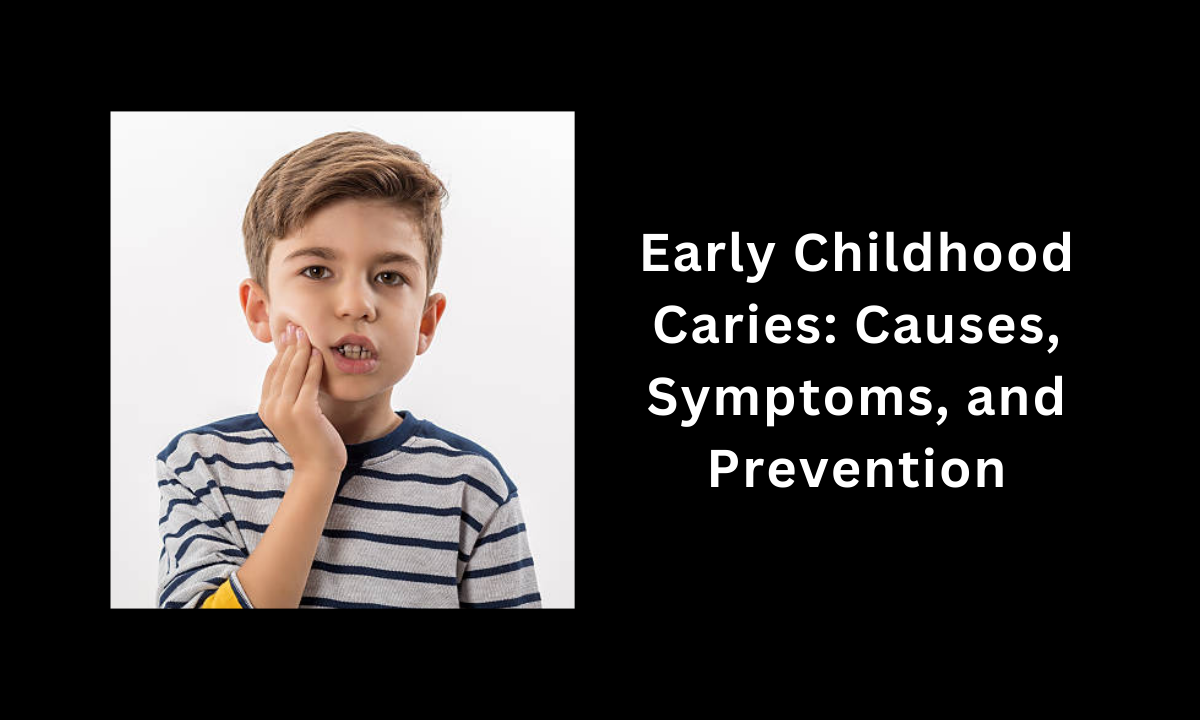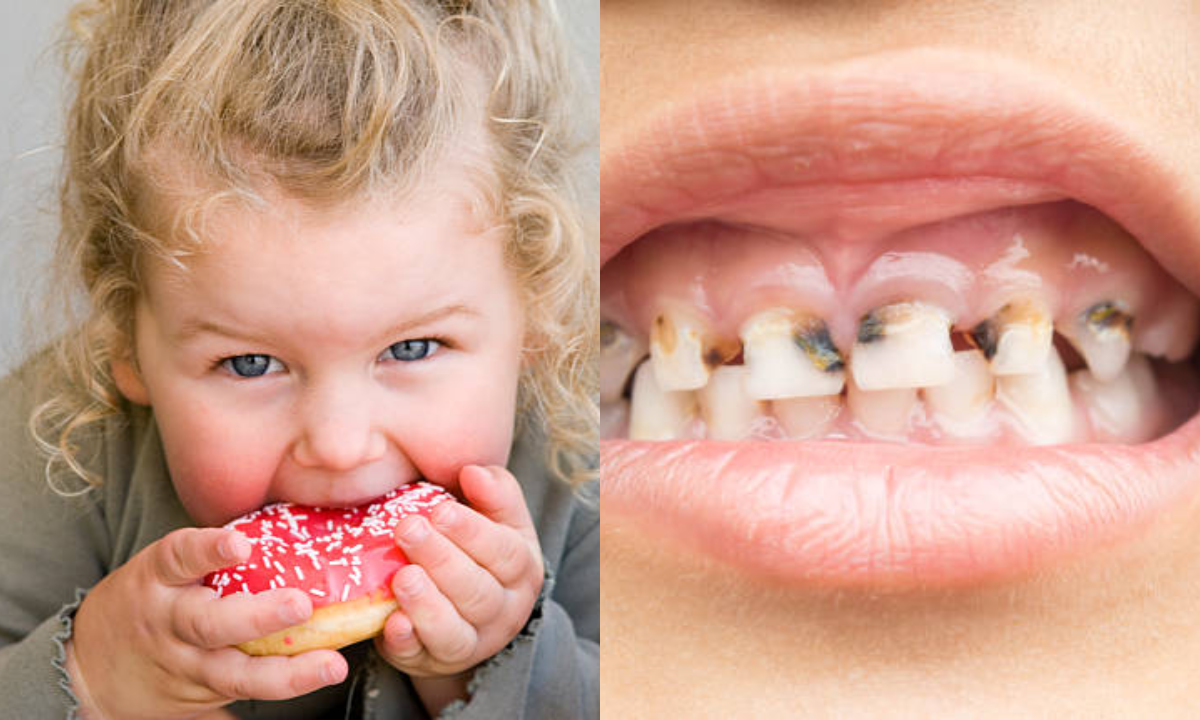Early childhood caries is a condition that indicates severe tooth decay in infants and young children. Among the most widespread problems throughout the world, the condition of rapid destruction of primary teeth has significant long-term effects on oral health and, in turn, a child’s overall health. This disease characteristically develops due to poor oral hygiene, frequent intake of sweet foods, and inappropriate dental care. They hardly came to be seen by parents and their caregivers since babies’ teeth do fall out when they grow. Unrestored dental caries may lead to pain, infection, and also difficulty in speaking and eating.
With growing awareness of oral health, a pediatric dentist in Whitefield can help in the early diagnosis and management of ECC. In this article, we will explore the causes, symptoms, and preventive measures for early childhood caries, focusing on the need for proactive dental care for young children.
What are Early Childhood Caries?
Early childhood caries refers to tooth decay in children when they are under six years old. It can start where the first ever tooth eruption is and develops fast and powerfully if allowed over time, destroying a large area of the teeth. The primary probable source of decay is the appearance of white spots on the enamel, which may lead to cavities that result in ache and infection, followed by early loss.
ECC is also sometimes referred to as baby bottle tooth decay due to the common occurrence with bottle feeding that persists for a longer time. Many children sleep with bottles of milk or sweet liquid in them, leading to early childhood caries. It can be prevented if there is good oral hygiene and dental check-ups with proper dieting.
Causes of Early Childhood Caries
Several factors contribute to early childhood caries, including poor oral hygiene, dietary habits, and bacterial infections. Understanding these causes can help in preventing the condition.
1. Poor Oral Hygiene
Inadequate brushing and flossing allow plaque and bacteria to accumulate on the teeth, leading to cavities. Many parents assume that baby teeth do not require much care, but neglecting oral hygiene can result in severe dental issues.
2. Habitual Ingestion of Intake of Sugary Foods and Drinks
Children often have a habit of ingesting excessive sugary foods and juices/milk; they are at more risk of a cavity. The sugary subject offers the perfect conditions for the survival of bacteria which causes acid erosion of the teeth enamel.
3. Transference of Bacteria through Carers:
The bacteria causing caries can be transmitted from the caregivers to the infants by sharing utensils or cleaning pacifiers with their mouths. Streptococcus mutans, the bacteria primarily responsible for cavities, easily spreads from parents to children.
4. Prolonged bottle feeding or nighttime breastfeeding
Allowing a bottle containing milk, juice, or formula to induce sleep in the child leaves a pocket of sugar that pools against the teeth over long periods. Night breastfeeding increases the risk for ECC if done without proper care of the oral cavity.
5. Inadequate Fluoride Exposure
Fluoride hardens the enamel on the teeth and cavities develop due to an insufficient amount of fluoride that can either come from water or fluoride toothpaste. Children lacking enough fluoride easily develop cavities.
6. Genetic Factors
Some babies just are born caries-prone due to unique weaknesses in the enamel or having a higher chance of infection at the bacterial levels.
Early Signs of Early Childhood Caries
ECC can be identified through various symptoms and signs; early diagnosis helps in preventing its further complications
1. White Spots on Teeth
These white chalky spots on enamel are usually in the early stages of ECC because they indicate enamel demineralization by acidic products of oral bacteria.
2. Brown or Black Cavities
As the decay progresses, the white spots become brown or black cavities. These cavities can enlarge and lead to destruction of the teeth.
3. Tooth Sensitivity
Dental caries due to ECC usually lead to pain resulting from erosion of the enamel from hot, cold, or sweet foods and drinks.
4. Pain and Discomfort
Dental caries may lead to moderate to severe pain that makes eating, chewing, or sleeping difficult for children.
5. Swelling or Pus Formation
In severe cases, the gums swell or pus forms in the infected area of the tooth. In such a case, children need to be seen by a dentist immediately.
6. Bad Breath
Bad breath that persists is a sign of bacterial infection in the mouth because of untreated decay.
Prevention of Early Childhood Caries
Prevention of ECC requires good oral hygiene practices, dietary modifications, and regular dental checkups. Here are some effective preventive measures:
1. Start Oral Care Early
Dental care should start even before the first tooth appears. Cleaning the baby’s gums with a clean, damp cloth after feeding removes bacteria. When the teeth come in, brushing with a soft toothbrush and fluoride toothpaste is a must.
2. Reduce Sugary Foods and Drinks
Avoid frequent consumption of sugary snacks, juices, and sweetened drinks. Encourage children to drink water and healthy foods that will strengthen their teeth, such as dairy products, vegetables, and fruits.
3. Do Not Put Babies to Sleep with a Bottle
Give bottles filled with milk or juice only during waking hours to avoid baby bottle tooth decay. In case the child needs a drink at night, give water.
4. By One Year – Cup Drinking
Switch to cup drinking before reaching one year to minimize the long duration of exposure to sugary liquid.
5. Fluoride Toothpaste and Treatments
Fluoride makes the enamel of the tooth stronger and works against the prevention of cavities. Parents may use a smaller amount of fluoride toothpaste when the child is less than three years old while for older ones, it could be the size of a pea for fluoride treatments under a pediatric dentist in Whitefield.
6. Regular Dental Checkup
Regular dental visits to a Whitefield dental clinic ensure early detection of caries and professional guidance on oral hygiene. The first dental visit should occur by the child’s first birthday.
7. Avoid Sharing Utensils or Cleaning Pacifiers with the Mouth
Prevent bacterial transmission by not sharing spoons, forks, or pacifiers with children. Cleaning pacifiers with water instead of a parent’s saliva minimizes bacterial transfer.
8. Provide a Balanced Diet
A diet that is high in calcium, phosphorus, and vitamins ensures strong and healthy teeth. Cheese, yogurt, leafy greens, and nuts promote good oral health.
Treatment Options for Early Childhood Caries
When ECC is diagnosed, treatment depends on the severity of the condition.
- Fluoride Treatments: Early-stage caries can be reversed in some cases by professional fluoride applications.
- Dental Sealants: Dental sealants prevent the grooves of the teeth from gathering plaque and bacteria.
- Fillings and Crowns: For cavities, fillings or stainless steel crowns may be used to restore the affected tooth.
- Extraction of Tooth: In severe cases where the tooth cannot be saved, extraction is necessary to prevent infection from spreading.
Conclusion
Early childhood caries is a preventable yet common dental problem that affects young children. Poor oral hygiene, a diet high on sugar, and prolonged bottle feeding are some factors contributing to this, but the parents will be taking proper preventive measures against the child so that the overall oral health is well maintained. Thus, periodic visits to pediatric dentists, good oral hygiene, and reduction of sugar intake are important measures against ECC, and a sound foundation for dental health care in the future is laid with a healthy child. Early dental care is given importance by parents to save their child’s teeth and create a lifetime of oral health. If you think your child may have ECC, visit a Whitefield dental clinic for early treatment and expert advice.


